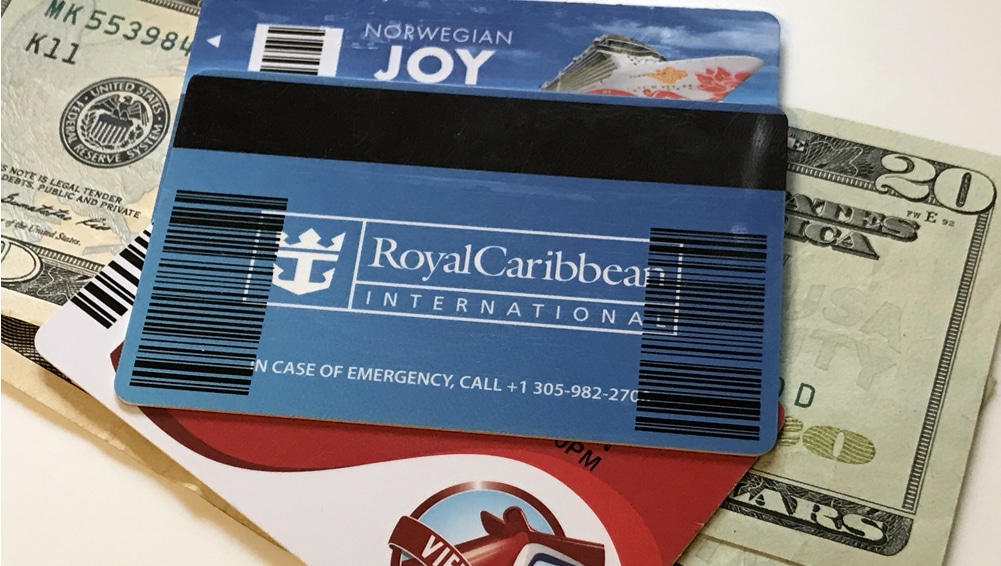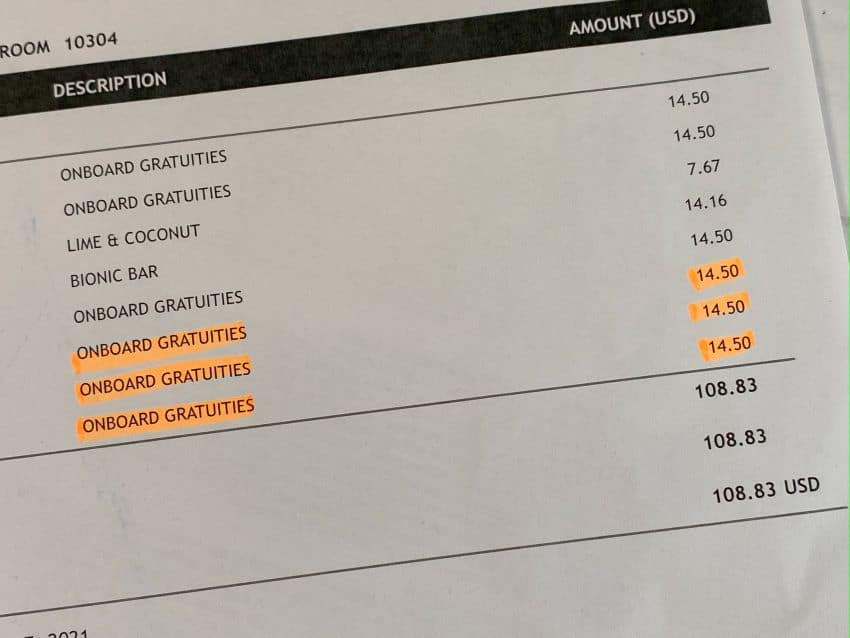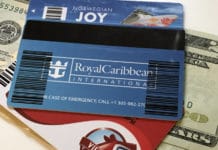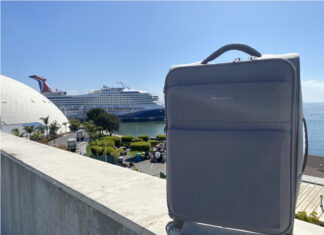Not sure whether you should prepay your gratuities before your cruise or wait until you’re on the ship? It’s a common question. Paying early offers some benefits, but it also means more money out of your pocket before you even get on the ship. At the same time, it can seem strange to pay gratuities before you’ve actually received service.

Our opinion? We are fans of prepaying the gratuities just because it makes things simpler to have your charges taken care of before you board. It’s one less charge to worry about on the ship.
But there are some very good reasons on both sides of the issue. Here’s what you need to know…
What Are Gratuities? Why Do I Have to Pay Them?
If you’re a first-time cruiser, then the entire concept of gratuities may be a mystery. It used to be that when you took a cruise, you were left with envelopes in your cabin toward the end of the cruise. You’d put in money to give to the crew members that provided direct service during the trip.
These days things are done automatically. Cruise lines charge each passenger a set daily fee — usually around $16-$18 per person, per day — that is then distributed to the staff. This money is usually pooled and then given to people like the room steward who cleans the cabin, as well as the dining and waitstaff. It also covers people behind the scenes that provide help for passenger services, like the dishwashers and others.
So instead of having to worry about distributing the right amount of cash to everyone (and not leaving anyone out), it’s done for you.
Now, the timing of this charge can be strange as most of us are used to paying a tip after the service received and adjusting it based on the level of service. In addition, the gratuity charges are on top of your cruise fare, instead of being included in the price. Based on these two factors, gratuity charges can be a surprise to people that haven’t cruised before.
So why do you have to pay them?
Well, technically you don’t. If you receive poor service or simply don’t want to pay, then you can have the charges removed by visiting Guest Services during the cruise. That said, this is definitely considered poor taste, similar to stiffing a waiter at a restaurant back home. Crew members go out of their way to make sure you have a great experience and the compensation from gratuities is appreciated.
The Mechanics of Automatic Gratuities

As mentioned, instead of the old days of depending on people to tip on their own with cash in envelopes, the process is now done automatically based on a set daily rate.
So with two people sailing a seven-day cruise where the gratuity amount is $18 per person, per day, they will see a total charge of $252. This amount can be prepaid, meaning that you elect to pay it when you purchase your cruise. If you want to forego that option, then you can wait and pay it on the ship.
If you choose to not prepay, then either a daily amount will be charged to your account or it will be tacked on in full at the end of the cruise. When it’s time to settle your bill, the gratuity charge is paid for with the credit card on file.
Benefits of Prepaying Gratuities
With the option of prepaying gratuities or paying them later, what are the benefits of paying early?
The biggest advantage is simply getting the charge out of the way. By paying the charge at the same time you pay your cruise, it’s one less cost that will hit your onboard account while you are cruising.
Another advantage is that cruise lines regularly raise gratuity amounts. So if you book a cruise that departs a year from now, the gratuity price may be higher when you sail. People that pay beforehand are grandfathered in under the rate they’ve already paid.
By prepaying, you can have the cost all taken care of before you sail without experiencing a huge hit to your pocketbook. It’s also nice not to have a couple of extra hundred dollars to pay at the end of your cruise when settling your onboard account.
Drawbacks of Prepaying Gratuities
What about the drawbacks of prepaying?
The biggest issue would have to do with your view about paying a tip for service before you’ve even received that service. For many people this just feels backward. After all, what if you’ve already paid the gratuities and get lousy service? (In that case, you can still go to Guest Services to explain the situation.)
As well, some people like to hang onto their cash for as long as possible. If you prepay the tip charges when you buy the cruise, you are essentially giving the cruise line more of your money to hold, potentially months in advance of your trip.
One strange thing to consider is that you might spend differently on the ship if you prepay or don’t. When you have a significant change on your account like daily gratuities, it can make you feel like you’ve spent a lot already and be more budget-conscious on the rest of your cruise.
Will the Staff Treat You Differently if You Prepay or Don’t?
Having sailed both paying the charges before sailing and paying them once on the ship, we can say that we’ve seen absolutely no difference in the service level on the cruise.
Bottom Line: In general, we opt to prepay gratuities on a cruise simply because we like not having to worry about them creating a higher bill once on the ship. That said, there’s no harm in opting to wait as the gratuities will be charged automatically once on the ship. It all comes down to personal preference.













Speaking as a veteran of many cruises, I have come to the conclusion that the service has degraded with prepaid gratuities because some of the staff know they’re getting tipped anyway. Some staff members do go out of their way and I tip additional accordingly.
On my last cruise the service was average to below average. My cabin steward deserved double, kitchen and wait staff were horrible. Drink staff totally ignored you if you had prepayed drinks. I asked for a cookie, was turned down, thought they were kidding, they weren’t, been on 11 cruises, NEVER been turned down for a cookie…..
I am totally against tipping ahead of a cruise makes not sense to me Tips are for service is it not ? plus i don’t trust the cruise lines who gets the $ i would rather give cash to the people who give us good service and we have been on 40 plus cruises around the world If i get lousy service in a restaurant, should i tip well Hech No!
there is no way that these people are not paid a decent wage already. tipping is based 100% on service. If I ask you for a steak and you burn it then have to make a new one and it take an hour. why would I tip?
$16 a day or whatever doesn’t seem bad but am I getting the service to justify it?
I despise the entitled society we live in where tips are automatic. We need to go like Europe and most of the world where this arcane practice is ended. Pay the workers whatever you deem a fair wage and they can choose to work or not.
As for cruise gratuities. Whether a hotel or a cruise cabin, I want no one going in my room. I am not that messy, so all I need is one towel per week (as long as it’s not muggy the whole time, your towel will be fine) and a garbage change or two. At a hotel, I just leave the bag out of my room and ask for one when I pass by a maid.
At restaurants, I tip well for very good service and I will “stiff” them for poor service. 10-12% for average service.
Omg u are my best friend! I agree 100%!
When speaking to cruise staff on ships they never receive additional monies other
than their contractual rate they sign on for when excepting employment by the
cruise companies. I prefer to give gratuities to the staff that serve me directly i.e.
stewards, waiters, bar tenders accordingly. And, ironically pay out more than the
the add-on “suggested” gratuities – cruise lines want to automatically add on to my
bill. I would never “stiff” these hard working individuals.
Cruise ship tipping has many unanswered questions:
– Which crew member categories on the ship receive money from these tips?
– What percentage, if any, of our tips only make-up a crew member’s base salary?
– When our tips are distributed to crew members which category of crew members receive what percentage of the tips?
Acccording to a recent article on CruiseCritic
Excerpt from
If you’re wondering who gets these daily gratuities, it’s broken down between three positions in the rotational dining rooms — the head server, assistant server and server — along with the steward that cleans and services your room.
The article has no mention of anything else concerning this issue.
I have gotten into the habit of pre paying gratuities a few weeks before a cruise. It’s a good compromise: the cruise line isn’t holding my money for months and months, and I don’t have to deal with the cost while on the cruise.
And I’ve never minded increases in gratuities. Those folks work hard, so I’m happy to pay the few dollars more when I pay in the weeks leading up to the cruise.